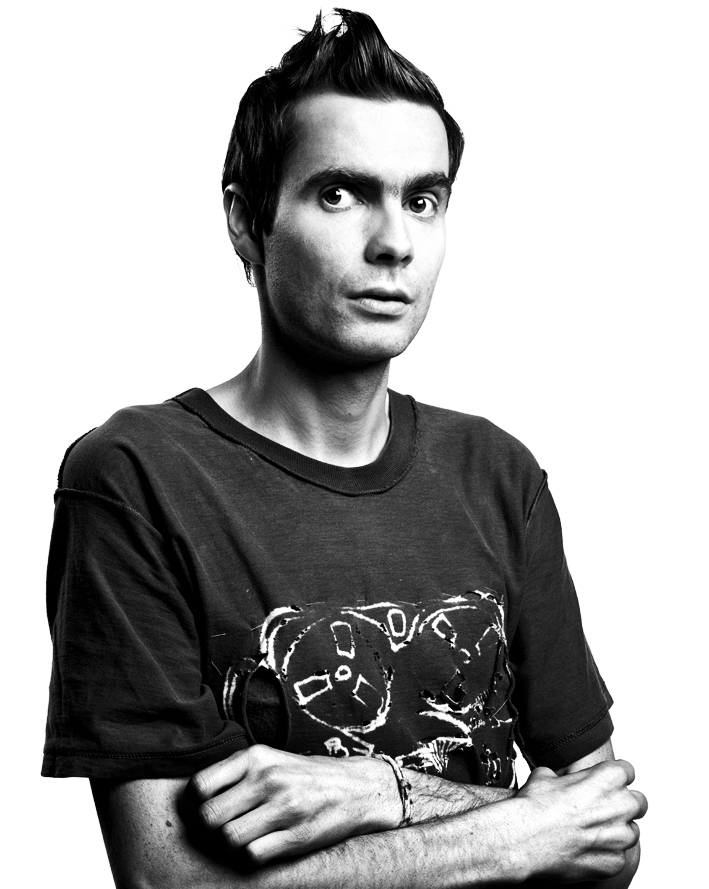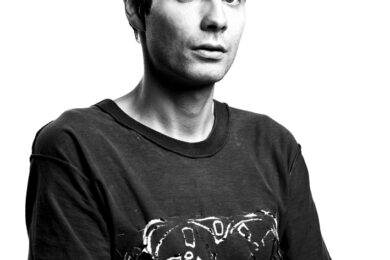Jónsi Birgisson may be best known for his ethereal twanging with Sigur Rós, but in a recent chat with The Quietus he revealed his early love for heavy metal.
"I grew up with [it]," he explained to scribe Jonny Garret, before adding: "Sometimes I still listen to Metallica when I am drunk. I listen to all kinds of heavy metal, but the old stuff, when it was good."
Jónsi also discussed his new album Go, WH Auden and being haunted by animals…
How’s the tour going so far? There’s been some great comments left on the website…
Jónsi Birgisson: Oh I don’t ever read those things. I’m sure there’s some nice stuff on there but there are also so many crazy people. I haven’t read my reviews or anything like that for 10 years.
So how can you tell how an album goes down?
JB: I don’t. I think it’s best to hear it from your friends and family, and the people you work with.
And what have they said about it? Do they like it?
JB: No…Yeah yeah they do.
I guess they wouldn’t say if they didn’t.
JB: Exactly. That’s a problem. Maybe you should just live in your own bubble.
Do you think that’s easier?
JB: I think so. It is what it is. You just live, do what you do and then you just die.
That’s a short way of summing it up… So I read that you were a fan of Metallica?
JB: Yes, I grew up with Heavy Metal.
Do you still listen to it now?
JB: Sometimes I still listen to Metallica when I am drunk. I listen to all kinds of heavy metal, but the old stuff, when it was good.
And when did it stop being good?
JB: Probably when I stopped listening to it. When I was 16 or something like that, but earlier Metallica I really like that sort of stuff. I was 13 when I started listening to Metal, I think I drew from it the energy and the power. And early metal was really melodic, with great song-writing actually.
Can you still see its influence in the music you write?
JB: Yes in some ways, in some songs. Like I say, the melody and the song writing is very good. With metal it’s all about the power and melody, it moves you. I try to do something similar, and to get the power when I play a show some songs get distorted and I like that.
Have you moved away from it now and would you go back? The new album is much lighter in tone.
JB: Go is actually 50-50 between the colourful, playful and energetic and the melancholic and the slow. What I wanted was an acoustic, really minimal album recorded in my living room. Some songs are 10 or 15 years old. I had a lot of acoustic songs I had collected over the years, written on acoustic guitar or piano or harmonium or ukulele. They were all written with voice and a solo instrument, and really stripped down when I’m writing it. It didn’t really happen until I went into the studio with my boyfriend who helped me produce the album.
And what happened?
JB: It was bonkers. I didn’t know it would turn out so grandiose. I had Nico Muhly, an American composer, who did the strings, brass and wind arrangements and he does things really playful and colourful which I really wanted. I also got Samuli Kosminen, a Finnish drummer, who adds a lot of rhythmic energy and emotional power. So I went into the studio and got musicians and friends to play and after that session I couldn’t go back. It was starting to take shape and I really wanted to push it forward, and make it as crazy as I could.
How do you mean you couldn’t go back?
JB: It was kind of schizophrenic in some ways. The drums were way more crazy than I thought and the arrangements were way more in your face than I thought and after I heard that I knew I couldn’t go back. I thought I really have to push this in the other direction, and go more crazy than strip it down. So in the end there was lots and lots of layers on the tracks.
It’s a strange process because you write songs, maybe even 10 years ago, just sat wth an acoustic guitar in your apartment in your underwear and the songs come quite quickly. Then it travels with you in your head for ten years and the lyrics always come really late in the process.
When you have the first spark of a song, and you’re sat at a piano playing some chords you start singing over it to find a melody you just sing some sounds which come to you. It’s like another instrument, and then you write the lyrics. For me music flows really easily and naturally. But words are so naked and fragile and you really have to strip yourself, or bare yourself. So ten years pass and then all of a sudden you’re in the studio adding bass and drums and backing vocals. The song builds up so quickly. It’s a funny way to work.
If the words are harder to write, why did you decide to write the new album in English?
JB: Just so it’s even harder. Writing in English for my new album made it even harder. It was a good experiment for me and I learned a lot from it. I had never written properly in English before. My boyfriend is American so I always speak English when I am at home, but 95 per cent of everyday language is always the same, so while I speak quite good English my vocabulary isn’t that big. It was hard for me to make it interesting; to find synonyms and stuff like that.
So how did you teach yourself to write lyrics in English?
JB: So I used the technology, I used the interwebs. There are websites where they help you work with words and find synonyms and rhymes. I also tried to read some English poetry, to surround myself in beautiful words.
Who were you reading?
JB: I was reading WH Auden. He had a really famous poem used in Four Weddings and a Funeral, I think. He is so beautiful; you should check him out, he’s done some amazing stuff. He’s dead now though. I really like colourful, rich, sculpted sentences, but I still feel like I have a long way to go. It’s like everything, the more you keep doing it the more you keep at it the better you get.
What do you think people take from music when you sing in Icelandic?
JB: Well 99.99 per cent of the population of the world don’t understand Icelandic which is actually quite nice. It may be liberating for some. They have to imagine what the song is about and maybe they put their own meaning to it. At the same time it’s quite nice when you sing in English and you put some pictures or images in people’s minds or they grab one word here, one word there and they can build something from that.
I was doing some research on Iceland and realised there was only a population of 300,000. How come there are so many great bands? Did they listen to Metallica too?
JB: Well when I was growing up we listened to a lot of English and American bands, but not many came to Iceland because we’re quite isolated. Bands have never really come to Iceland to play. Only in recent years have bands been coming, but I remember Iron Maiden came once and Whitesnake. Weird bands to come, and they only did once. So we didn’t get to see many concerts when I was growing up
But I think there are so many factors. I think it’s a good thing that we are so few in Iceland. There is so much space and unconsciously we are a young country. The nature and everything is so young, so raw. There is definitely energy just in the earth and the surroundings, but we don’t have a lot of heritage on our backs – history of music and stuff – so we are not afraid to what the hell we want and we’re not trying to copy other peoples stuff, we have our own style. Also it’s quite cold there, and in colder climates you tend to be more productive than in hotter climates.
Because you stay inside more?
JB: It’s dark 9 months of the year and everyone is depressed. So you have to create a lot to be happy and to feel fulfilled. Being in a band and writing music with your friends is the best thing to do when you’re young.
So a lot of your friends were in bands?
JB: A lot of my friends were in bands, but there was never this idea of trying to be famous or trying to be popular. You just met your friends in a garage and played – that was enough. It was so satisfying, just doing stuff you loved. By doing that you kind of create your own sound.
So aside from Metallica, what else influences you? People always try to link your music to Iceland’s landscape.
JB: No, never. Never consciously, never. I don’t know who would do that. Maybe unconsciously it affects me, and mainly because I live in the countryside…in the small towns. Not a city. But still if you live in a city it’s so small, the population is only 300,000 in the whole country and the big city Reykjavik is just so small in comparison to like London. And there’s so much space and so few people around you… maybe it has in a way.
What about all the animal sounds on the album, and in your shows? Why are they there?
JB: I don’t know. I just came in and recorded and there were just… animals haunting me. You know – well you don’t – but it was nice though.
What do you mean by haunting?
JB: They were in my head or something. I could hear in the songs that they were crying out for some animal sounds. Some songs already sounded like animals. It’s both instruments and samples making the sounds. I was talking to Nico about the arrangement of the album and we wanted the strings to sound like birds and stuff like that…



